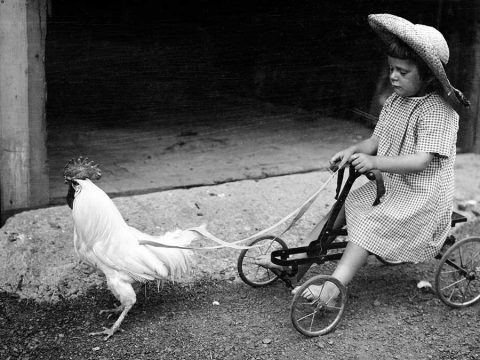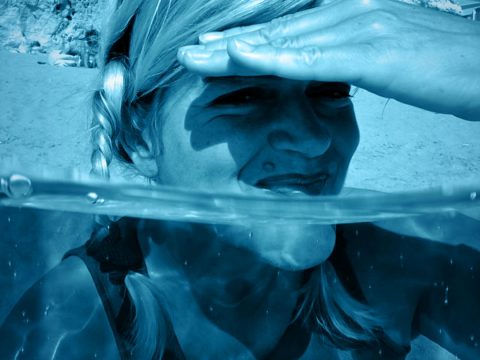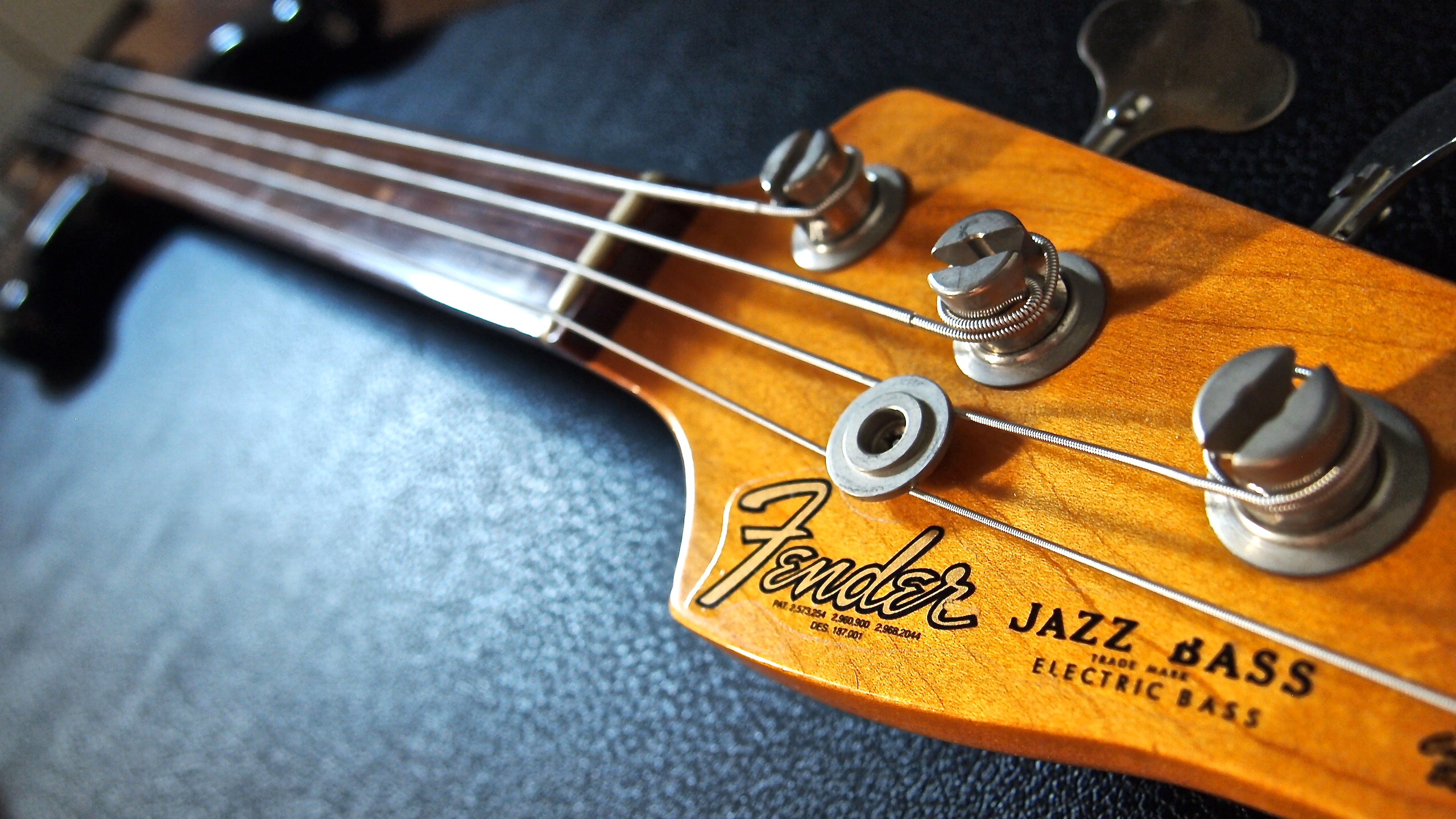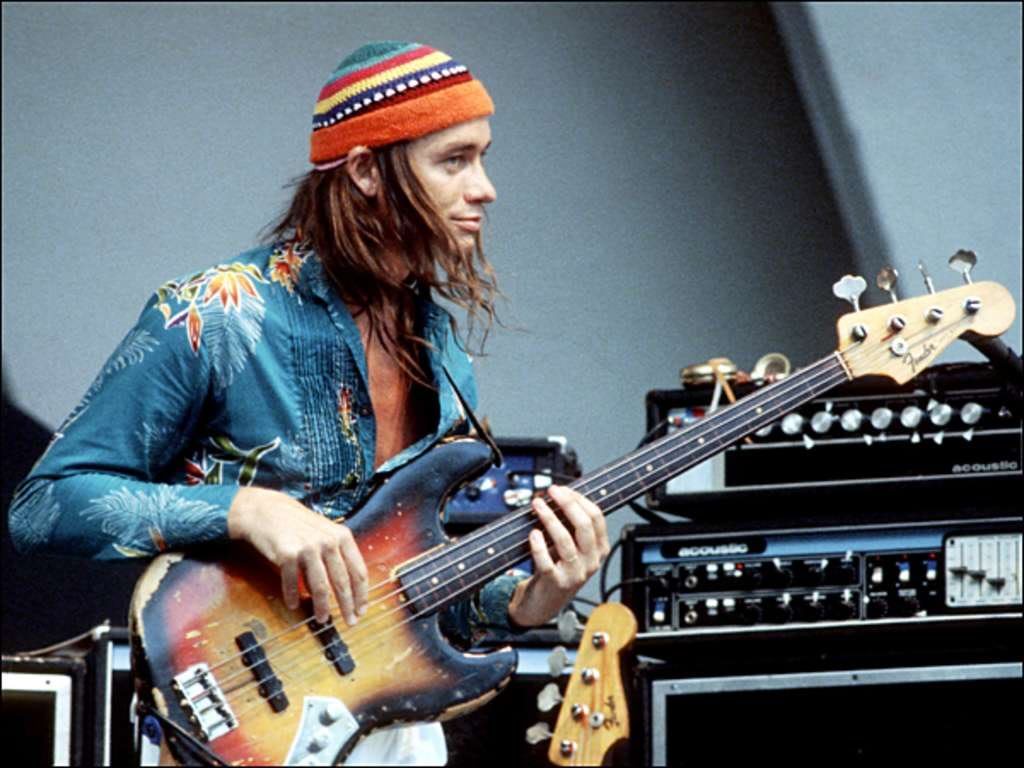Jaco Pastorius
Als Jaco Pastorius sein erstes Soloalbum vor nunmehr fast 40 Jahren herausbrachte, revolutionierte er durch sein Bass-Spiel alles was man bis dato auf diesem Instrument gehört hatte. Dieses Debüt war sein Meisterstück. Als die Scheibe 1976 auf den Markt kam, war das Echo darauf unglaublich: es markiert
einen Meilenstein in der Entwicklung des E-Basstils, mit dem Pastorius seinen Bass von der bloßen Begleitfunktion zur vollwertigen Leadstimme erhebt. Technisch galt er als musikalisches Genie, dem bei der Umsetzung seiner Ideen in die hörbare Wirklichkeit keine Grenzen gesetzt waren.
„Seine auch an europäischen Komponisten wie Johann Sebastian Bach geschulte, rhythmisch ungewöhnlich präzise groovende individuelle Spielweise mit rasenden Läufen unter Einbeziehung von natürlichen und künstlichen Flageoletttönen in allen Lagen des Griffbretts setzte völlig neue Maßstäbe vor allem beim Spiel auf dem bundlosen Bass (Fretless Bass)“.
Für Pat Metheny war Pastorius einer der letzten Jazzmusiker des 20. Jahrhunderts, der die Musikwelt als Ganzes entscheidend beeinflusst hat. Die Einzig- und Großarigkeit dieser CD entsteht allerdings erst durch die Zusammenarbeit mit einem weiteren Genie: Herbie Hancock. Dieser ist für die Musik dieses Albums nicht weniger von Bedeutung. Die Kombination der beiden führt zu einem wahren Feuerwerk des Jazz.
Come On, Come Over, das einzige Stück mit Vocals, wurde von damaligen Stars gespielt: Gesang von Sam&Dave, Bläser von den Brecker Brothers. Und dazu der funky 16tel Groove von Pastorius.
April 2002
Bill Milkowski
The legend of Jaco Pastorius, the late, self-proclaimed “world’s greatest bass player,” shines as brightly over time as that of other musical immortals like Charlie Parker, John Coltrane, Jimi Hendrix and Charles Mingus. “Like Charlie Parker, he was the shot heard ’round the world,” says his Florida mentor Ira Sullivan. “Bird was that step beyond, and I think Jaco was the same way.”
Today, more than 14 years after his tragic death on Sept. 21, 1987, at the hands of a bouncer outside a Florida nightclub, we still marvel at what Jaco accomplished in his relatively short span as a creative force on the planet. Not only did he revolutionize the role of his chosen instrument, the fretless electric bass guitar, but he helped change the course of music itself through his innovations. And the proof is right there on the recordings—his stunning 1976 solo debut, Jaco Pastorius, and ambitious follow-up projects, Word of Mouth and Invitation; his brilliant collaborations with Joni Mitchell (notably 1976’s masterpiece, Hejira); and a string of six groundbreaking albums with Weather Report (from 1976’s Black Market to the landmark Heavy Weather and Grammy-winning 8:30 to his swan song with the group, 1982’s self-titled Weather Report). One need only turn on the radio or check out current trends in jazz, rock, pop, reggae, calypso, meringue, salsa, Afro-pop, Cuban, Brazilian or drum ’n’ bass to hear that the impact Jaco made resonates to this day.
Had he lived, John Francis Pastorius III would’ve celebrated his 50th birthday last December 1. One can only wonder what else he might’ve accomplished had he remained an active and creative force on the scene over the past 13 years. The mind boggles at the thought of Jaco collaborating with rappers and reggae toasters, DJs and programmers, classical string quartets and klezmer bands—you name it. His intuitive genius transcended all genres; his profound musicality naturally fit all grooves.
But fate intervened and Jaco never got the chance to take it to the next level. Some say that his destiny was carved out for him, that his mission here on the planet was completed and that he just moved on, leaving behind a rich recorded legacy (along with a couple of generations of imitators who followed in his wake).
The narrative arc of Jaco’s career was dramatic, indeed like “a meteor streaking across the Florida night sky,” as Sullivan put it. From local notoriety on the South Florida R&B circuit to international fame with Weather Report, the premier fusion band of the ’70s, Jaco rode that skyrocket to oblivion, eventually crashing on the streets of New York City in the mid-’80s. But before he met his Waterloo that fateful morning in a parking lot just outside the seedy Midnight Bottle Club, located in a suburban mall in Wilton Manors, Fla., Jaco had converted hordes of believers all over the world. Today that unique two-syllable name still registers awe in Japan and France, Germany and Switzerland, Italy and England, Cameroon and Korea, all throughout North America and South America—and everywhere else that people recognize heart and soul.
A lot is known about Jaco’s triumphs and tragedies, his adventures and misadventures and unprecedented virtuosity on the electric bass. Little is known, however, about where it all came from—until now.
Bob Bobbing, a boyhood pal of Jaco’s who grew up with him in the Fort Lauderdale area, has put together Portrait of Jaco: The Early Years, a two-CD audio documentary that chronicles for the first time the evolution of this quintessentially American musical genius. Bobbing, a fellow bass player who met Jaco at an audition while competing for the same gig, became fast friends with Pastorius, immediately recognizing his enormous talent, ambition and sense of mission: as early as 1973 Jaco professed to hardcore bebopper Sullivan, who, previous to meeting the 21-year-old phenom, had looked down on the electric bass, “I’m out to make this noninstrument an instrument.”
What’s remarkable in retrospect is that Bobbing had the awareness of Jaco’s budding genius and the foresight to document his development. Remember, Jaco was just another 16-year-old kid from the neighborhood back in 1968 when Bobbing began taping him. This was no famous person, no iconic performer. And yet, there was Bobbing—like an obsessed Dean Benedetti in pursuit of a high-flying Bird—accompanying Jaco from gig to gig with his trusty Sony reel-to-reel two-track tape recorder, capturing for all time the process of Pastorius honing his peerless chops.
What possessed him to document the development of this completely unknown musical entity?“I did it because Jaco was doing something that was so unique,” says Bobbing. “You have to understand, I was a bass player myself back in 1968. I was in R&B bands that played ‘Midnight Hour’ and ‘Mustang Sally’ and all those familiar tunes where the bass parts were not all that challenging. No one was really doing that much on the bass at the time. And along comes Jaco, who is playing chords, grabbing a handful of harmonics, quoting from bebop heads, making it interesting and fun—all within the context of those same R&B tunes. Everybody takes those things for granted now but back then he was so far ahead of his time. For a bass player like myself, hearing Jaco doing all that stuff back then was like making an incredible discovery. It was akin to an astronomer discovering an extraterrestrial in Roswell in 1947 or like an archeologist who finds King Tut’s tomb or a full skeleton of a tyrannosaurus rex or something. His playing had such an effect on me that I felt compelled to document it, and Jaco loved for me to tape him. We’d sit around and listen back to these tapes and laugh.”
While holding down his own gigs as a working bass player on the South Florida music scene, Bobbing became Jaco’s biggest booster through the late ’60s, talking him up to other bandleaders and club owners. Bobbing remembers local guitarist Bert Angonez was another early fan on a mission to spread the word about this bass-playing phenomenon. “Bert and I were out there waving the flag for Jaco before anybody,” says Bobbing. “We actually got into arguments with people about Jaco. A lot of the musicians around Fort Lauderdale at that time didn’t understand what Jaco was doing. They dismissed it as nervous overplaying but I thought of it more as creative overplaying. Jaco was really an outcast until his first album came out. After that, everybody wanted to know him.”
Over a span of nine years (1968-1976), Bobbing accumulated dozens of hours of tapes documenting Jaco on various gigs as well as casual situations, practicing at home and talking shop. Whether it was with the ultrafunky Hammond B-3 organ trio Woodchuck, the soul band Tommy Strand & the Upper Hand or the powerhouse touring aggregation Wayne Cochran & the C.C. Riders, Bobbing would invariably come in, unobtrusively set up his equipment, push the record button and capture the magic of the moment. And when Jaco finally hit the big time with Weather Report in 1976, those reels of tape went into a drawer somewhere in Bobbing’s home, where they remained for the next 15 years.
“After he joined Weather Report and got famous, people began to sensationalize their relationship with Jaco,” says Bobbing. “Too many groupies and hangers-on came out of the woodwork after that first album. Eventually people would do things just to hang with him—get him drinks, cocaine, whatever—just so they could say, ‘Wow, I hung with Jaco.’ And these were some of the same people who were putting him down before as a showoff. I really hated the whole hypocrisy of that scene, so I went away.”
It wasn’t until 1991, after being interviewed for my book Jaco: The Extraordinary and Tragic Life of Jaco Pastorius (Backbeat Books) that Bobbing even considered sharing those archival Jaco tapes. Previous to that, rumors had persisted in musician circles about the legendary Wayne Cochran & the C.C. Riders tapes. (I first heard about them in the early ’80s from bassist Mark Egan, a former student of Jaco’s at the University of Miami who had toured and recorded from 1977 to 1980 with Pat Metheny.)
And yet Bobbing, who had ironically been so perceptive and savvy to record Jaco in the first place back in those early years, was completely unaware of the importance these tapes would hold for other fans. “It’s amazing that there aren’t any recordings of any of this stuff out there,” says Bobbing. “I guess I’m the only one who ever thought to capture those moments.” To him, the tapes were merely golden memories of happier times, what he calls Jaco’s “Garden of Eden days.” The prospect of releasing them never crossed his mind until our fateful meeting 10 years ago.
At my urging, during my interview with Bobbing, he brought the tapes out of storage and popped them on the same old Sony reel-to-reel machine he initially used to record them back in the day. Just a cursory listen to those tapes instantly blew me away. First of all, the quality was surprisingly good: Jaco’s bass is very present in the mix and certainly conveyed the musical course that he was on at that time. But more importantly, the ideas were all so fully realized. Listening to this archival collection you’ll hear the seeds of what would later manifest themselves as full-blown gems like “Portrait of Tracy,” “Opus Pocus” or “Continuum.” All the trademarks are intact—the resounding woody tone, the full chords, the unrelenting groove, the remarkable endurance, the voicelike phrasing, the saxlike fluidity over changes, the melodic invention and harmonic ingenuity all flowing and funky. This was indeed full-tilt Jaco, years before Weather Report came into the picture.
On the basis of that two-day listening session back in 1991, I tried to persuade Bobbing of the historical importance of his archival tapes: surely Jacophiles the world over would kill to hear the roots and evolution of his unique genius. And no one else on the planet possessed these precious documents, some of which go back to when Jaco was a precocious 16-year-old playing all the instrumental parts to Pee Wee Ellis’ “The Chicken” in his bedroom.
Ten years later—after a few false starts, much disappointment and endless hours of making contacts, negotiating with the Pastorius estate, tracking down tapes, getting proper clearances and gathering personal testimony—these rare tapes are finally coming to light. And part of the reason that Portrait of Jaco: The Early Years has taken this long to come to fruition is that Bobbing, the ultimate Jaco fan, needed that much time to do it right. Not only has he drawn from his own personal collection of tapes documenting those R&B bands Pastorius gigged with, but he’s gone the extra mile to acquire additional music documenting Jaco’s sideman stints with Ira Sullivan, the Peter Graves Orchestra, Pat Metheny, Florida soul man Little Beaver, Weather Report and Joni Mitchell. And he weaves in spoken-word testimony from key figures in Jaco’s life between songs on the CD. There are excerpts from Jaco’s original demo tapes for his solo debut, recorded in 1974 at Criteria Studios in Miami, and there are casual moments of Jaco and Bobbing talking shop. An added treat is a roundtable discussion with a cast of characters from the Downbeat Lounge, the all-black club where a teenaged Jaco would often sit in on baritone sax.
In telling the tale of Jaco Pastorius, Bobbing draws the listener in through word and music, one serving to illustrate or underscore the other. In the end, after hearing several musical discoveries along the way and bearing witness to the eloquent testimony of Wayne Cochran, Joni Mitchell, Joe Zawinul, Pat Metheny and Jaco’s die-hard jazzbo father, Jack, we come away with the most complete picture ever assembled of the mythic bass player’s rise to glory.
With Portrait of Jaco: The Early Years, Bobbing has brought to life a piece of his own history in this heartfelt tribute to a boyhood pal who just happened to really be “the world’s greatest bass player.”
Portrait of Jaco: The Early Years is available from www.JacoTheEarlyYears.com.
Portraits of Jaco:
Excerpts from The Early Years collection.
Jack Pastorius (Jaco’s father)
I think Jaco Pastorius was the biggest [Frank] Sinatra freak. One time his mother brought him to a gig I was playing at Charlie Johnson’s Crab House. He was just a little guy, maybe five or six. I got Jaco up on the bandstand, I sat him on the piano and he sang Sinatra’s “Come Fly With Me” and everybody went bananas. That was the first time I thought, “This guy is going to be something else!” I knew then that Jaco was going somewhere, some way.
Jaco Pastorius
I have a fretless bass so it’s virtually like I’m playing a wood bass. In other words, the strings go into the wood on the neck and then being that it’s a bass guitar it gets that bright sound and direct sound. I’m the first guy to be using a fretless, is actually what it boils down to, and really get down and play it because nobody can play it because they cannot play it in tune. You know, I play in tune like a cello player, you know? It’s just legitimate vibrato. That’s it. There’s no tricks; it’s just all in the hands. I just have a standard fretless. It’s a standard 1962 Fender Jazz bass that I took the frets out of. And in the studio I don’t use an amp, I just go direct. It’s virtually acoustic.
Little Beaver (R&B band leader)
I’m used to showing the bass player what lines to play. With Jaco—I didn’t have to tell him nothing. Only thing I had to tell him was, “Slow down, man!” He was playing some guitar licks and I had to be careful I didn’t get in his way. I said, “Man, this guy is funky, he’s funky. And he ain’t even heard this song before.” I mean, he just come in here and all he wanted to know was where the breaks was, you know? He just fell right in. And we were shocked, you know? I mean, this was a white kid and here he was coming in playing funk. And I didn’t feel like he had paid the dues to be playing like that. You had to be on the chitlins circuit for a long time, eatin’ pork ’n’ beans out the can, traveling on the road. You pay your dues and you learn how to feel that stuff. Jaco was a little young for that but still he fell right in. He had been listening to the right stuff, I guess.
Joe Zawinul
We were playing in Miami at Gusman Hall in 1974. After the show this guy approaches me saying, “Mr. Zawinul, I was at the concert. It was OK. By the way, let me introduce myself. My name is John Francis Pastorius III, I’m the greatest bass player in the world.” And I really didn’t feel good about that whole thing. So I said, “Get the fuck outta here.” And he was just standing there and said, “I’ve been a great fan for many years and my father was a Cannonball Adderley fan and I would like to play some of my music for you.” And I wanted to get rid of him but one of the [journalists] I was standing with there gave me a little elbow and said, “You should check him out, you know?” So he came by the next morning, very well mannered, very pleasant. I played him a couple of tunes. I offered him a drink and he said, “No sir.” He brought me a cassette of this song “Continuum.” It had this wonderful tone. And I was not sure if he was playing an electric bass or not because of the way it sounded. So this part I really liked. I said, “Well I’ll tell you something. I’ll give you my address, we’ll stay in contact but I’m not in need for any bass player right now.” So I came back home and all of a sudden I get letters from him. He wrote about his family and he said he hoped we could play together some day. And then one day he sent me a cassette and that was with “Donna Lee” on it. And after this he had called me, and this is when I had asked him if he also played electric bass. Because the way he was moving the melody—I had never heard anybody do that before—the way he plays, the way he approaches the bass. And I told Wayne [Shorter] about that. I remember saying, “If this kid would play our music, it would be something.”
I liked his spirit, Wayne liked his spirit. He came in the band and we did very well right from the beginning. He had this extra thing we needed. So we had a phenomenal band. We recorded Heavy Weather and that’s when we started taking off. And it was really his personality that brought the whole band a step higher. And for Wayne and me, he was the third; three forceful personalities all totally different—and nobody giving an inch, yet all together. It was the greatest band ever. There’s no question about it, yeah! And for his friendship and his unselfishness, I’ll always love Jaco as a friend. And I can’t imagine how anything would’ve been without him.
Bobby Economou (drummer with Ira Sullivan)
I remember Jaco explaining to me how to get above the instrument, have your ears float above the music and hear the whole composition with everything—not just you playing but everything. And I learned how to listen that way.
Joni Mitchell
The way my musical ear developed was kind of odd. I was attracted first to the high end of music and last the bottom. But by the time I got to the bottom end of music I began to have very strong opinions about what the bass should do and they were in conflict with what the bass was doing. I didn’t understand why the high end could have so much freedom and the low end was so locked in. And I would make suggestions to bass players—couldn’t they, you know, leave some holes, more like classical music, and go sailing up into the high end and be more expressive. And I would sing the parts to the bass players and ask them to play it and they would refuse. At that particular time there weren’t a lot of women in music instructing players, and sometimes bass players would, frankly, get annoyed. I forget who it was now but I was working with a bass player and giving him some instruction and he finally said to me, “Look, Joni, there’s this weird bass player in Florida who plays with Phyllis Diller and Bob Hope. You’d probably like him.” In other words, he thought what I was telling him was crazy and he thought Jaco’s playing was crazy. It’s not that he was admiring it but that it was weird. I was weird and Jaco was weird and we would probably get along just fine [laughs]. I didn’t want to go back to playing alone: I took a long shot; I sent for Jaco.
The bass players that I worked with before just kind of played through it like four beats to the bar, you know, polka-dotting along. And they couldn’t see the shapes of the music or where the pressure points were. They couldn’t grasp it. So you had to wait for somebody like Jaco to come along who had one foot in rock ’n’ roll and one foot in jazz. And when Jaco came in on the dates, he was doing what I wanted, which was a more classical counterpoint to my melodies—and leaving space—and then going into a figure and then leaving another hole and then slurping along and sliding along. He had some interrelationship to the music. There was humor in the right places—so there was a personality there. It was no longer a team player, a good supportive player; it was personality that deserved to be in the foreground. We were conceptually kindred. And to my amazement, not only was he doing some of things I was asking people to do but he was playing Stravinsky figures in the upper middle register and fitting them in all the right places. And his choice of notes and his approach was very similar to what I was trying to get at. So it was as if I dreamed him because I didn’t have to give him any instruction. I could just kind of cut him loose and stand back and celebrate his choices.
Pat Metheny
I first met Jaco in the fall of 1972. I had just moved to Miami from Kansas City, where I grew up. We met at a place called Bachelors III, where he was playing in the Peter Graves Orchestra. That’s when we really got to know each other and really hit it off. And we very quickly found a lot of things that we had in common as musicians, especially in terms of the role that our instruments played in jazz, particularly in the way that we wanted to change those roles. And you know, he was interested in 12-tone kind of things. He was interested in people like Ornette Coleman the same way that I was. He was also interested and aware of Schoenberg and Stravinsky and modern classical music as well as this sort of funk and rock and pop and of course jazz elements. But there was all this other stuff going on underneath. In those early years where we were kind of on a mission from God in our own individual ways that paralleled each other and manifested itself in the music that appears on Bright Size Life and the gigs that we did around that time with the trio with [drummer Bob] Moses.
If you just took Hejira and Heavy Weather and Bright Size Life and his first couple records—just that little body of work right there sort of significantly changed the course of music in the last quarter of the 20th century, certainly in terms of the role of the bass, bass playing in general and without question the electric bass itself. You know, he changed the landscape forever—and there’s not really many musicians you can really say that about on any instrument.
It’s now gotten to the point where you sort of hear Jaco’s sound everywhere but nobody’s ever come close to it. As many bass players as I’ve heard trying to do that thing there is nobody that is even remotely close to what he was doing in terms of sound, in terms of rhythm and particularly in terms of spirit. Because he came up with it. And you just can’t simulate that.
Jaco’s pursuit for individuality is one of his most incredible achievements in the sense that he achieved it. He made it. He found a thing that was really his and his alone. And as somebody who’s aspiring to an artistic endeavor in their life, I don’t know that you can find any measure of success that would be greater than what Jaco actually managed to manifest into sound over the course of his career.
Ira Sullivan
When I first met him I told him that I didn’t really like electric Fender bass with acoustic piano. And Jaco laughed. He said, “Oh, I know about you. But I’m out to make this noninstrument an instrument.” And I was struck by that remark. After that we’d get together and start jamming a little bit and he definitely had something different going on. And I was really impressed with how dedicated he was to music. He didn’t hang out to get high. I don’t think I ever saw Jaco drink a beer! And it was so refreshing working with totally new approaches that I hadn’t worked with any of the jazz musicians, any of the beboppers. And I realized that I had immersed myself in something that was really different.
Wayne Cochran (R&B band leader)
Jaco Pastorius was a freak. It was unnatural what he could do on the bass. I ain’t never seen anybody play a bass that fast or that precise, never. I mean I see guys now…basically they probably picked it up from him. He was an aberration of nature that just was not supposed to happen, and it happened. It ain’t never gonna happen again. Jaco happened and that was it. He’s gone. But lemme tell you this: Jaco was a good kid. I believe he had a good heart inside.
https://www.youtube.com/watch?v=tTcbTg8O548









